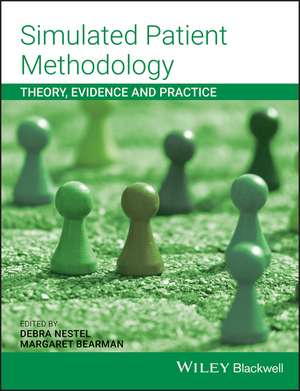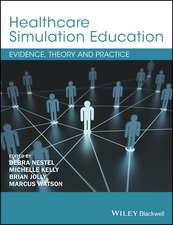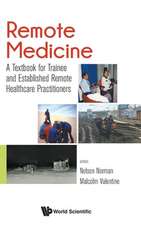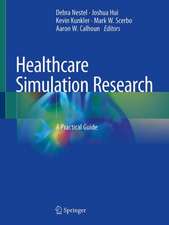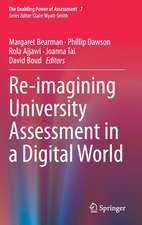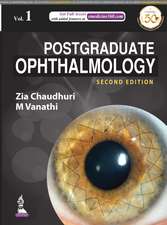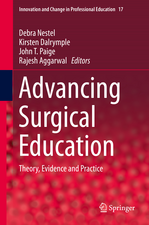Simulated Patient Methodology – Theory, Evidence and Practice
Autor D Nestelen Limba Engleză Paperback – 18 dec 2014
Preț: 411.83 lei
Preț vechi: 433.50 lei
-5% Nou
Puncte Express: 618
Preț estimativ în valută:
78.80€ • 82.50$ • 65.20£
78.80€ • 82.50$ • 65.20£
Carte tipărită la comandă
Livrare economică 05-19 aprilie
Preluare comenzi: 021 569.72.76
Specificații
ISBN-13: 9781118761007
ISBN-10: 1118761006
Pagini: 168
Dimensiuni: 189 x 246 x 9 mm
Greutate: 0.36 kg
Editura: Wiley
Locul publicării:Chichester, United Kingdom
ISBN-10: 1118761006
Pagini: 168
Dimensiuni: 189 x 246 x 9 mm
Greutate: 0.36 kg
Editura: Wiley
Locul publicării:Chichester, United Kingdom
Public țintă
Primary: Qualified health professionals running courses on clinical examination (doctors, nurses, medical educators); Simulated Patient (SP) practitionersCuprins
Contributors, vii Foreword, ix 1 Introduction to simulated patient methodology, 1 Debra Nestel and Margaret Bearman Part 1: Foundational Frameworks, 5 2 Scope of contemporary simulated patient methodology, 7 Debra Nestel, Tracy Morrison and Shane Pritchard 3 The content and process of simulated patient-based learning activities, 16 Jill E Thistlethwaite and George D Ridgway 4 Communities of practice and simulated patient methodology, 23 Debra Nestel, Jan-Joost Rethans and Gayle A Gliva-McConvey Part 2: Theoretical Perspectives, 31 5 Learning theories and simulated patient methodology, 33 Margaret Bearman and Debra Nestel 6 The dramatic arts and simulated patient methodology, 39 Cathy M Smith, Tanya L Edlington, Richard Lawton and Debra Nestel 7 Simulated interaction and authentic interaction - a place for conversation analysis?, 46 Ged M Murtagh 8 Simulated patient methodology and the discourses of health professional education, 53 Nancy L McNaughton and Brian Hodges Part 3: Educational Practice, 61 9 Preparation: developing scenarios and training for role portrayal, 63 Debra Nestel, Carol Fleishman and Margaret Bearman 10 Simulated patients as teachers: the role of feedback, 71 Debra Nestel, Margaret Bearman and Carol Fleishman 11 Teaching and learning physical examination skills with simulated patients, 79 Anna K Vnuk 12 Simulated patient methodology and assessment, 85 Cathy M Smith, Carol C O'Byrne and Debra Nestel 13 Simulated patient programme management, 93 Tanya Tierney, Elaine E Gill and Pamela J Harvey Part 4: Case Studies: Innovations Across the Health Professions, 103 14 Real patient participation in simulation, 105 Rosamund Snow 15 Interprofessional community care: a simulated clinic for healthcare professional learners, 110 Pamela J Taylor, Mollie Burley and Debra Nestel 16 Telephone incognito simulated patients, 115 Jan-Joost Rethans and Hay Derkx 17 Hybrid simulated patient methodology: managing maternal deterioration, 120 Simon JR Cooper and Mary Anne Biro 18 Learning intimate examinations: the specialist role of Gynaecological Teaching Associates, 126 Karen M Reynolds, Jim Parle and Shirin Irani 19 Advanced nursing practice in aged care: developing communication and management skills in patients with Alzheimer's disease, 130 Jennifer H Fisher, Jane H Kass-Wolff, Ernestine Kotthoff-Burrell and Jeanie M Youngwerth 20 Skills development in person-centred physiotherapy, 134 Felicity C Blackstock and Shane Pritchard 21 Simulated family and healthcare professionals: consent for organ transplantation, 139 Gayle A Gliva-McConvey Part 5: Conclusion, 145 22 The future of simulated patient methodology, 147 Margaret Bearman and Debra Nestel Index, 151
Notă biografică
Debra Nestel is Professor of Simulation Education in Healthcare, School of Rural Health, HealthPEER (Health Professions Education and Educational Research), Faculty of Medicine, Nursing and Health Sciences, Monash University Margaret Bearman is Associate Professor, HealthPEER (Health Professions Education and Educational Research), Faculty of Medicine, Nursing and Health Sciences, Monash University
Descriere
Simulated Patient Methodology is a timely book, aimed at health professional educators and Simulated Patient (SP) practitioners. It connects theory and evidence with practice to ensure maximum benefit for those involved in SP programmes, in order to inform practice and promote innovation.
